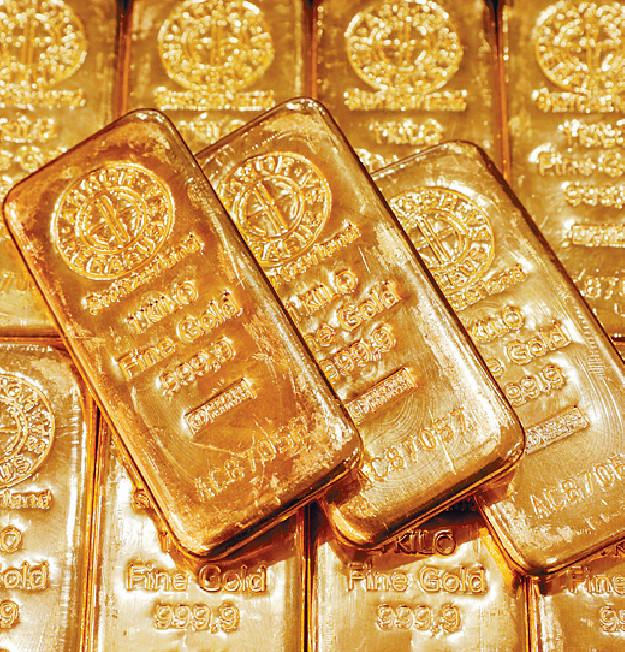The U.S. stock market is doing well, the Nasdaq has risen for 3 consecutive days, but the Hong Kong stock market is at a high level. Many, including several large state-owned enterprises, including CITIC (267), China Mobile (941), China Telecom (728), Sinopec (386) and Bank of China (3988) all hit a one-year high. The market narrowed, but they still made money.
Raise mining to buy heavy gold prices to improve
Wall Street has recently been at odds with the Federal Reserve Board. The Board of Governors has repeatedly warned that the threat of inflation has not been eliminated. In the future, the goal will be to suppress inflation back to 2%, and interest rates will not fall back so quickly. Consumer data entered the market ahead of the CPI, and the Nasdaq, which is sensitive to interest rates, has risen in recent days. According to market tradition, the stock market usually runs ahead of the real economy in the first half of the year. The Reserve Board emphasizes that interest rates will still rise again, but the market estimates that interest rates will be cut in July at the earliest. Technology stocks are rushing to catch up.
The focus of the investment community is on the whereabouts of interest rates. The bond market reflects that interest rates are close to peaking. Similarly, after the US dollar exchange rate reached a high level at the end of last year, it began to show signs of dying. With the US dollar exchange rate weakening, gold prices have risen in recent months. Gold stocks climbed. Gold mining stocks are an outlier among stocks. They followed the price of gold and outperformed the stock market. Taking Zhaojin (1818) as an example, the low price in the past six months was 5.28 yuan on September 28 last year. Although the Hang Seng Index fell sharply in October, Zhaojin’s stock price But it went up again and again, reaching a high of 9.66 yuan on January 9, with a cumulative increase of 82%. It closed at 9.39 yuan yesterday, and its performance was still strong. The lowest price of gold in the past six months was US$1,627 per ounce on September 25. Afterwards, although the United States raised interest rates sharply, the price of gold still went against the current. The level of 1,882 yuan this week was the highest level in the period.
Rising interest rates are not good for the price of gold. In the past six months, the price of gold has been able to catch up with rising interest rates. It is believed to be related to the sharp drop in virtual currencies. The main driving force for this round of interest rate hikes is the sharp rise in inflation, which has eroded the value of currencies. As a currency substitute, gold should be good. However, since the central bank’s vigorous printing of money has spawned virtual currencies, gold has also been “looted”. Even if it floods the streets, Gold prices have not benefited much.
However, the huge wave of sharp interest rate hikes hit, many virtual currency platforms were exposed and the tide receded without pants, and the role of the gold price as a shelter from the typhoon once again took a heavy toll. Among the gold mining stocks, Zhao Metal, an aggressive company, strengthened its cooperation with Zijin (2899) at the end of last year to increase its holdings of the largest gold mine in the Mainland and enhance its operating efficiency. If the US dollar peaks and the gold price improves, it will be icing on the cake. Afterwards, the stock price reacted positively.
BYD wins championship by selling cars
Funds tended towards state-owned enterprise stocks yesterday. The Hang Seng Index closed at 21,223 points, a day low, and rose 78 points to 21,514 points. Market turnover was 159.5 billion yuan. BYD (1211) became the first in the newly announced auto sales rankings. It soared nearly 10% in the early stage and still rose by more than 5% in the closing market, making it the best performing blue chip stock. The decline in the index was mainly due to the correction of technology and Internet stocks. Alibaba (9988) and Tencent (700) once fell by more than 4%, and the closing losses narrowed. Alibaba fell 1.9% to close at 110.8 yuan; Tencent fell 2.6% to close at 364 yuan; Kuaishou (1024) fell 4.5% to close at 73.25 yuan; Bilibili (9626) jumped 5%.
Mainland property stocks with high volatility were also under pressure. Longfor (960) fell 3.7% to 25 yuan; Xincheng Development (1030) fell 5% to 3.15 yuan. Property management stocks Hejing Youhuo (3913) rose 7% to close at 1.83 yuan; CIFI Yongsheng Services (1995) fell 7% to close at 4.61 yuan.
Next week is the last week of the Year of the Tiger to do business. The leading bank CITIC CLSA will release its annual Feng Shui Index. It is expected that the Hang Seng Index will record an increase in the Year of the Rabbit, but there are hidden fluctuations. The Feng Shui Index estimates that the Hang Seng Index will rise to June after a brief correction in March, and then repeatedly fall to the annual low from August 8 to September 7, and usher in a big rebound in November, and At the end of the Year of the Rabbit, it returned to obedience, and the trend of Tingluo was a bit like a jump.
Jin Riku


